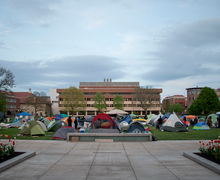City activists call for expansion of SPD review board
Madison Brown | Staff photographer
The review board was originally created in 1993 and was reestablished in 2011.
The Daily Orange is a nonprofit newsroom that receives no funding from Syracuse University. Consider donating today to support our mission.
Activists in the city of Syracuse are calling for the expansion of the Syracuse Citizen Review Board, an oversight committee that reviews complaints against the Syracuse Police Department.
Fifteen advocacy groups, including Last Chance for Change and Black Lives Matter Syracuse, presented nine demands to Mayor Ben Walsh and the Syracuse Common Council in June to reform SPD. One of the demands is to give the Citizen Review Board the power to discipline officers.
When addressing the groups’ other demands in July, Walsh deferred to the Common Council to pass legislation that would strengthen the CRB.
As activists continue to push to strengthen CRB, here’s an explainer on what the board is and why community members are working to increase its oversight over SPD:
History and structure
Syracuse established the CRB in 1993 to address police brutality. The city disbanded the board in 2010 and re-established it in 2011 with the power to subpoena officers, witnesses and any other evidence for hearings.
The board consists of 11 members. The mayor, the district councilor or the councilor at-large appoint the positions, which the Common Council approves. The council also hires an administrator to review complaints for the board and gather evidence for cases.
Anyone who has a grievance about SPD or would like to report misconduct by an SPD officer can file a complaint through the review board, said Ranette Releford, the board’s administrator. SU students are eligible to file complaints.
Once an individual files a complaint, SPD receives a copy to begin gathering information for an investigation, Releford said.
The board’s administrator then begins their investigation of the case. Releford gathers 911 audio, datasheets, eyewitness information, video footage and other evidence that the complainant can provide. If any injuries occurred during an encounter with an SPD officer, the board also asks the complainant to present medical records.
The administrator then writes a case summary to present to the board. The board meets once a month to review complaints and decide whether any should advance to a hearing, said Clifford Ryan, a local activist with OGs Against Gun Violence and a member of the board.
During a hearing, a three-member panel decides whether to provide SPD Chief Kenton Buckner with recommendation that an officer face discipline. The panel can also recommend what that discipline should entail, Releford said.
The police chief has the final say in handing down punishments to officers.
Barriers to discipline
Although the CRB has been effective given its confines, the city could provide more ways for the board to hold officers accountable, Releford and Ryan said. Since the police chief has the final say when it comes to disciplining officers, SPD doesn’t always follow the review board’s recommendations, they said.
The police union also poses an obstacle to administering discipline and can sometimes restrict even the SPD chief himself.
“There’s been a lot of steps in the right direction,” Ryan said. “(But) legislation could be passed that could force the police department to cooperate with the CRB more.”
Officers aren’t required to answer any questions during Releford’s investigation or prior to the hearing, she said. Officers can also file grievances opposing a case, she said.
“We still have an issue with getting the entire picture of what occurred,” Releford said.
Protesters are pushing to empower the CRB so its recommendations for officer discipline are enforceable. The demand is one of several local activist groups presented to Walsh to reform SPD, alongside removing school resource officers from local schools and releasing an inventory of equipment the department received through military surplus programs.
Reasons to empower
The CRB should have the power to enforce its rulings because police need to understand that the public’s input matters, Releford said. There’s a lack of transparency from SPD and accountability for officers, she said.
“You can’t have one without the other. You can’t be transparent and lack accountability. You lack accountability because you lack transparency,” Releford said. “We need to look at them as two essential parts to be a successful oversight committee.”
The city has attempted to make complaint hearings more public, Releford said. The community should question why SPD hasn’t carried out disciplinary action the review board has recommended, she said.
If the review board makes a recommendation, the city should take it seriously, Releford said. The public may be more likely to assist SPD in solving crimes if they trust that the department is accountable, she said.
“If you have a strong citizen oversight body, then the community trusts the police more,” Releford said. “(It’s) a win-win for the department and the community.”
Published on September 13, 2020 at 11:32 pm
Contact Sarah: [email protected] | @sarahalessan





